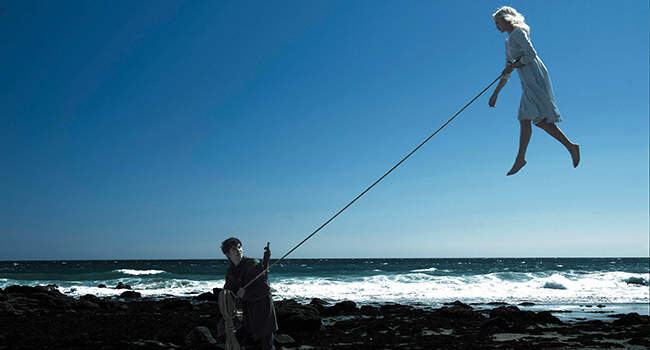Of course Tim Burton directed a movie revolving around the word ‘peculiar’. It’s no surprise that his newest project is Miss Peregrine’s Home for Peculiar Children: an adaption of a novel about a group of supernatural children hidden away from a closed-minded world. Like X-Men but with a dash of Tim Burton’s endearing strangeness.
The story’s cliché emotional center/main character is Jake, a lonely friendless teenager. Jake’s grandfather Abraham tells him stories of escaping the ‘monsters’ of the early 1940s (one of many thinly veiled metaphors for the Nazis and World War II) and finding a community of remarkably gifted children with which he subsequently lived. Something vaguely evil happens to grandpa Abe, prompting him to send Jake on a mission to rediscover this community. Jake’s parents are reluctant, but off he goes to find not only the truth — but himself as well.
You may already be able to tell that I don’t care much for the narrative setup of Miss Peregrine’s Home for Peculiar Children, but to be fair, neither does Tim Burton. The film has an effective screenplay and its premise drips with dark originality, but we can tangibly feel what parts of the material Burton was interested in and what spurred his disinterest.
When the movie is good, Burton is having more fun than he’s had in years. When he’s not, the movie isn’t good. Miss Peregrine is a mix of Burton at his unique best and Burton but flatter.
Good news first: the film is scattered with Burton-esque set pieces. This includes the set itself: many of the locations and shots look like they were lifted straight out of the virtuoso’s best movies. Suburban locales are reminiscent of the neighborhoods in Edward Scissorhands; exotic fantasies recall the grim tone of Batman; vibrant vibes draw inspiration from the landscapes of Big Fish. Burton is clearly interested in and inspired by the world of Miss Peregrine.
Burton fills the story’s most distinctive moments with his macabre charm. Resurrected bodies get a delightful stop-motion treatment; personal exchanges derive focus from a lovingly fixed gaze on the strange. Simply put, Burton’s enjoyment of (parts of) the novel comes through in his adapted filmmaking.
Unfortunately, the stretches between these moments are sunk by the director’s disinterest. Jane Goldman’s (Kick-Ass, Kingsman) screenplay — which is well written but obvious and over-explanatory, due to a skew towards kids’ movie territory — would work better if given room to breathe, but the direction often squashes it with a weighty boredom. The pacing feels like a reader skimming the original book for the best parts. Too frequently do essential parts of the story fall victim to this selective effort — even the ending, oddly enough.
Every aspect of the filmmaking suffers during these segments. The editing slackens and shots are arranged without personality. This leaves us with little to care about, as the screenplay tends to define the children only by their abilities or motives: they’re completely peculiar, but they’re not complete people.
And I don’t know who let Asa Butterfield act, but watching his performance was like watching a wooden plank read lines with the vocal efficacy of Siri. At least Eva Green lives up to the movie’s title. Terrance Stamp collects a paycheck as Jake’s grandfather.
Miss Peregrine’s Home for Peculiar Children is a blast during its strong portions though. For those who miss the gold old days of dark kids’ films (eating the eyeballs of children is a central plot point!), much of this is recommendable.
★★★ (3 out of 5)




